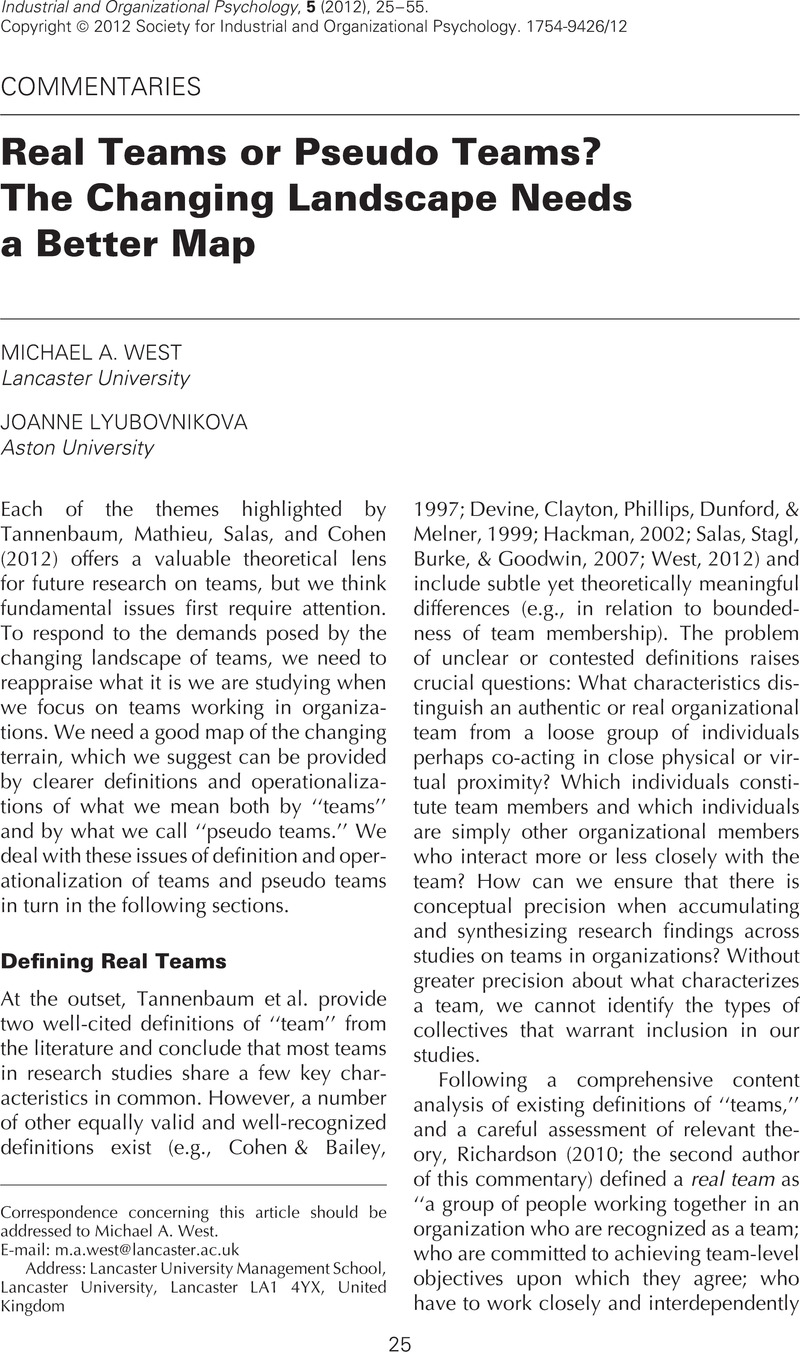Crossref Citations
This article has been cited by the following publications. This list is generated based on data provided by Crossref.
Hall, Kara L.
Vogel, Amanda L
Stipelman, Brooke A
Stokols, Daniel
Morgan, Glen
and
Gehlert, Sarah
2012.
A four-phase model of transdisciplinary team-based research: goals, team processes, and strategies.
Translational Behavioral Medicine,
Vol. 2,
Issue. 4,
p.
415.
Tannenbaum, Scott I.
Mathieu, John E.
Salas, Eduardo
and
Cohen, Debra
2012.
On Teams: Unifying Themes and the Way Ahead.
Industrial and Organizational Psychology,
Vol. 5,
Issue. 1,
p.
56.
Bunniss, Suzanne
and
Kelly, Diane R
2013.
Flux, questions, exclusion and compassion: collective learning in secondary care.
Medical Education,
Vol. 47,
Issue. 12,
p.
1197.
West, Michael A.
and
Lyubovnikova, Joanne
2013.
Illusions of team working in health care.
Journal of Health Organization and Management,
Vol. 27,
Issue. 1,
p.
134.
Perry, Emmett E.
Karney, Dennis F.
and
Spencer, Daniel G.
2013.
Team establishment of self‐managed work teams: a model from the field.
Team Performance Management: An International Journal,
Vol. 19,
Issue. 1/2,
p.
87.
A. West, Michael
Lyubovnikova, Joanne
Eckert, Regina
and
Denis, Jean-Louis
2014.
Collective leadership for cultures of high quality health care.
Journal of Organizational Effectiveness: People and Performance,
Vol. 1,
Issue. 3,
p.
240.
Lyubovnikova, Joanne
West, Michael A.
Dawson, Jeremy F.
and
Carter, Matthew R.
2015.
24-Karat or fool’s gold? Consequences of real team and co-acting group membership in healthcare organizations.
European Journal of Work and Organizational Psychology,
Vol. 24,
Issue. 6,
p.
929.
Gibson, Sally
2016.
Creating solutions instead of solving problems: Emerging roles for technical services departments.
Technical Services Quarterly,
Vol. 33,
Issue. 2,
p.
145.
Manser, Tanja
2016.
Quality Management in Intensive Care.
p.
152.
McKimm, Judy
and
O'Sullivan, Helen
2016.
When I say … leadership.
Medical Education,
Vol. 50,
Issue. 9,
p.
896.
Vogel, Amanda L.
and
Hall, Kara L.
2016.
Creating the Conditions for Implementing Team Principles in Cancer Care.
Journal of Oncology Practice,
Vol. 12,
Issue. 11,
p.
964.
Waldfogel, Julie M.
Battle, Dena J.
Rosen, Michael
Knight, Louise
Saiki, Catherine B.
Nesbit, Suzanne A.
Cooper, Rhonda S.
Browner, Ilene S.
Hoofring, Laura H.
Billing, Lynn S.
and
Dy, Sydney M.
2016.
Team Leadership and Cancer End-of-Life Decision Making.
Journal of Oncology Practice,
Vol. 12,
Issue. 11,
p.
1135.
Nisbet, Gillian
Dunn, Stewart
Lincoln, Michelle
and
Shaw, Joanne
2016.
Development and initial validation of the interprofessional team learning profiling questionnaire.
Journal of Interprofessional Care,
Vol. 30,
Issue. 3,
p.
278.
2016.
Quality Management in Intensive Care.
p.
95.
2017.
Building effective teams.
British Journal of Healthcare Assistants,
Vol. 11,
Issue. 12,
p.
610.
Agreli, Heloise F.
Peduzzi, Marina
and
Bailey, Christopher
2017.
Contributions of team climate in the study of interprofessional collaboration: A conceptual analysis.
Journal of Interprofessional Care,
Vol. 31,
Issue. 6,
p.
679.
Thompson, Christopher V.
Naumann, David N.
Fellows, Jodie L.
Bowley, Douglas M.
and
Suggett, Nigel
2017.
Post-traumatic stress disorder amongst surgical trainees: An unrecognised risk?.
The Surgeon,
Vol. 15,
Issue. 3,
p.
123.
Doekhie, Kirti D.
Buljac-Samardzic, Martina
Strating, Mathilde M. H.
and
Paauwe, Jaap
2017.
Who is on the primary care team? Professionals’ perceptions of the conceptualization of teams and the underlying factors: a mixed-methods study.
BMC Family Practice,
Vol. 18,
Issue. 1,
Kim, Sara
Bochatay, Naike
Relyea-Chew, Annemarie
Buttrick, Elizabeth
Amdahl, Chris
Kim, Laura
Frans, Elise
Mossanen, Matthew
Khandekar, Azhar
Fehr, Ryan
and
Lee, Young-Mee
2017.
Individual, interpersonal, and organisational factors of healthcare conflict: A scoping review.
Journal of Interprofessional Care,
Vol. 31,
Issue. 3,
p.
282.
Knight, Trevor
and
Senior, Carl
2017.
On the Very Model of a Modern Major Manager: The Importance of Academic Administrators in Support of the New Pedagogy.
Frontiers in Education,
Vol. 2,
Issue. ,



